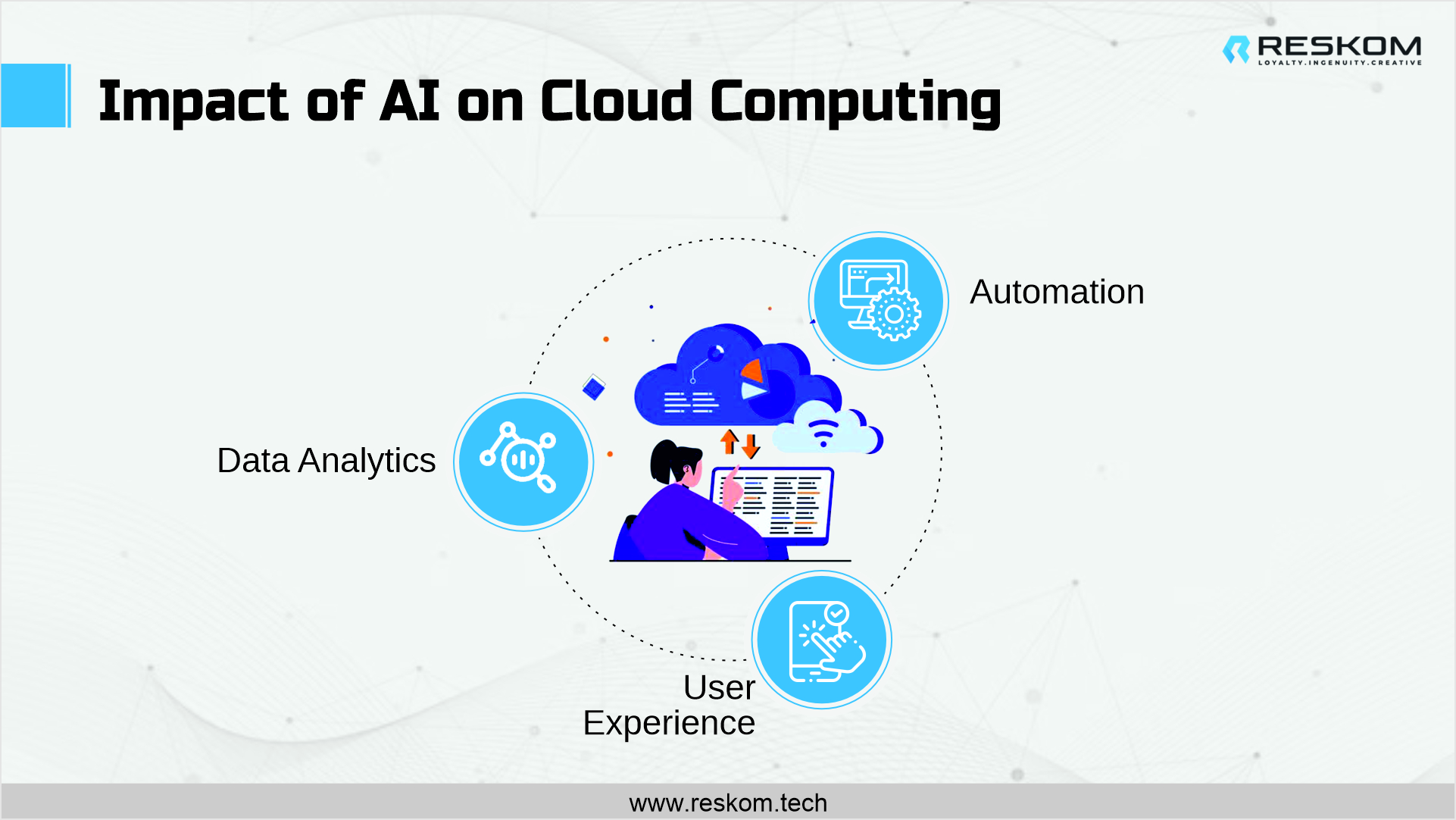The business world is intricately connected to a digital infrastructure heavily reliant on data analysis to enhance the customer experience. As a result, enterprises are increasingly digitizing their operations and exploring various technological options in the market. They are constantly seeking cost-effective solutions that offer robust data security.
Websites and smartphone apps have evolved into crucial corporate tools that enable digital communication across several platforms and build intricate computer networks. Cloud computing, a network that enables devices to connect over the internet and exchange information, is at the center of this digital transition.
This article will present an in-depth understanding of the cloud computing industry’s future and the emerging developments that will impact it. We’ll also look at how the combination of cloud computing and artificial intelligence (AI) has transformed the IT industry.

Understanding Cloud Computing
Before we explore the future of cloud computing, let’s grasp its fundamental concept. Cloud computing is a digital communication network that connects different devices and applications via the internet. It not only facilitates communication but also manages data processing and storage. This technology allows enterprises to efficiently run their business processes by leveraging cloud services, eliminating the need for significant investments in data handling and storage infrastructure.
In the past, businesses had to maintain extensive data centers to manage storage and data processing for analysis. Cloud providers revolutionized the market by offering accessible and cost-effective solutions that enhanced data protection through cloud storage. The rising popularity of cloud technology made it an integral part of business strategies across industries.
Cloud Computing Trends for the Future
The digital world is still being shaped by the constantly changing cloud computing environment. Let’s look at some of the key themes that are anticipated to shape the development of cloud computing:
Multi-Cloud / Hybrid Cloud
Multi-cloud, also known as hybrid cloud, combines both public and private cloud services, offering flexibility and workload sharing between the two. This approach is particularly favored by growing businesses that anticipate expanding data sources, as it provides enhanced control and security without significant expenses.
Quantum Computing
Quantum computing utilizes the principles of quantum physics to execute complex algorithms for data processing. It offers improved data-handling capacity, processing massive volumes of data in significantly less time. Quantum computing is a cost-effective trend with the potential to revolutionize cloud computing.
Serverless Computing
Serverless computing is a relatively new trend that creates a network architecture independent of physical servers for communication. It can redefine computing by eliminating the need for managing and maintaining servers, making it easier and more cost-effective for businesses to deploy new services.
Edge Computing
Edge computing brings cloud services closer to the edge of the network, allowing businesses to process and analyze data directly on the device where it’s stored. This trend reduces latency, enhances data privacy, saves costs, and enables real-time data processing, potentially reshaping the future of computing.
Future of Cloud Computing (2025-2030)
As cloud adoption continues to gain momentum, let’s consider some predictions for the future of cloud computing:
Growth of Multi-Cloud
The introduction of hybrid cloud environments has created dynamic cloud ecosystems that allow businesses to seamlessly integrate multiple cloud providers. This trend is expected to flourish, enabling enterprises to access the best cloud services for their specific requirements.
Rise of Edge Computing
The demand for real-time data analytics has driven cloud migration to the edge, where processing occurs closer to data sources. Edge computing promises reduced latency, improved personalization, enhanced data privacy, cost savings, and real-time data processing.
AI Integration
The integration of AI into cloud services will automate business operations, provide deeper insights, and enhance user experiences. AI-driven automation will boost operational efficiency, while advanced data analytics will offer valuable insights into network operations and customer behavior.
Impact of AI on Cloud Computing
The integration of artificial intelligence into cloud computing is a transformative development. AI enhances data processing, automation, and user experiences, revolutionizing the way cloud services are delivered and utilized:
Automation
AI automates various tasks, from data management to pattern recognition and trend prediction. This leads to improved operational efficiency, as AI doesn’t require constant supervision and testing to ensure accuracy.
Data Analytics
AI’s advanced data analytics capabilities provide valuable insights into network operations and user behavior. This leads to better reliability and more efficient business processes.
User Experience
The combination of AI and cloud computing has resulted in features like chatbots and personalized recommendations. These enhancements enhance the digital user experience, increasing customer satisfaction and profitability.
Cloud Computing in the Tech Industry
Cloud service providers have created a digital architecture that lets businesses grow quickly without making big infrastructure expenditures. This has made it possible for IT startups and business owners to succeed in a cutthroat and cutting-edge industry. The infrastructure of the sector has undergone a revolution because of the expansion of cloud services, which has accelerated technical advancement.
Cloud computing has increased connectedness and collaboration between people and businesses despite the difficulties involved in adjusting to new infrastructure and altering conventional communication techniques. It now serves as the foundation for innovation, automation, and teamwork in the IT sector.
Conclusion
The future of cloud computing is both exciting and transformative. As we anticipate the growth of multi-cloud, the rise of edge computing, and the integration of AI, we recognize the immense potential of cloud technology to reshape industries and enhance user experiences.
In the tech industry, cloud computing has redefined how businesses operate, fostering a competitive and innovative environment. As cloud service providers continue to evolve their offerings, the future promises a dynamic and resilient tech industry driven by cloud resources and creative technological solutions.
The intersection of cloud computing and artificial intelligence is a game-changer, automating processes, providing insights, and elevating user experiences. As these trends unfold, it is essential for businesses to adapt, embrace change, and harness the power of cloud computing to thrive in the digital age. The future of cloud computing is now, and its impact is profound.
RESKOM is a leading provider of cutting-edge cloud integration solutions. We specialize in helping businesses navigate the evolving landscape of cloud computing, leveraging emerging trends and technologies to optimize their operations. Our expertise in AI integration and cloud services empowers organizations to stay ahead of the curve and achieve seamless, secure, and efficient data management. With RESKOM, businesses can confidently embrace the future of cloud integration.


